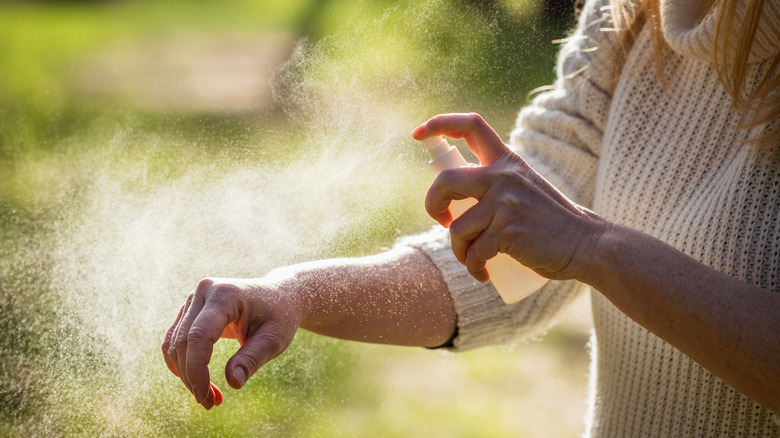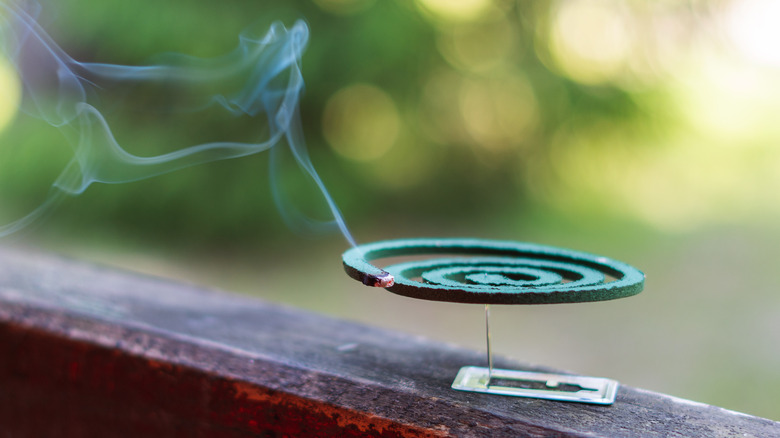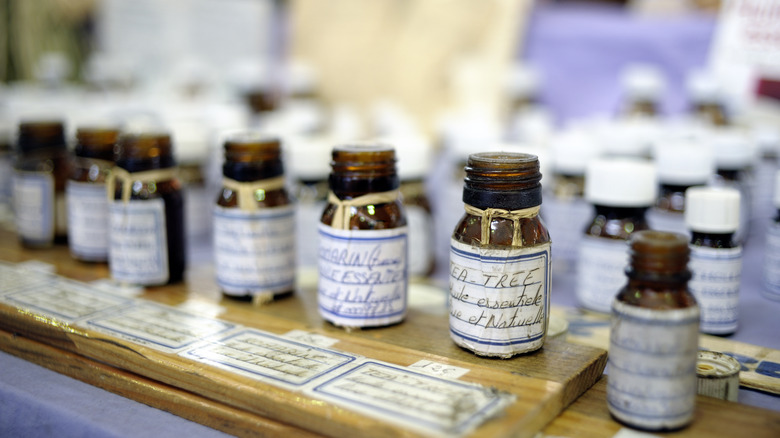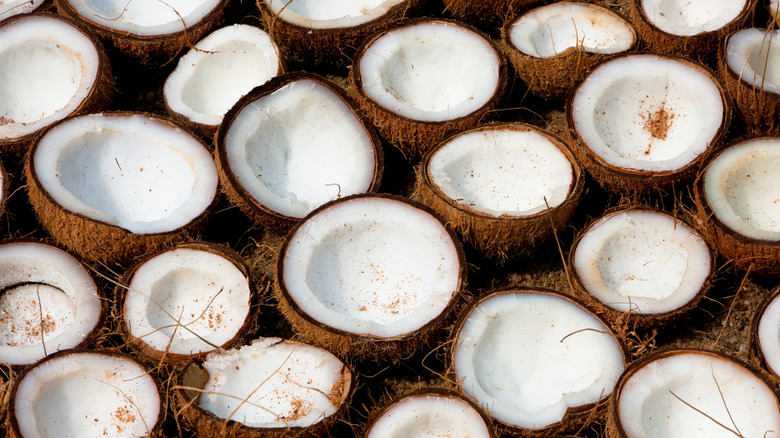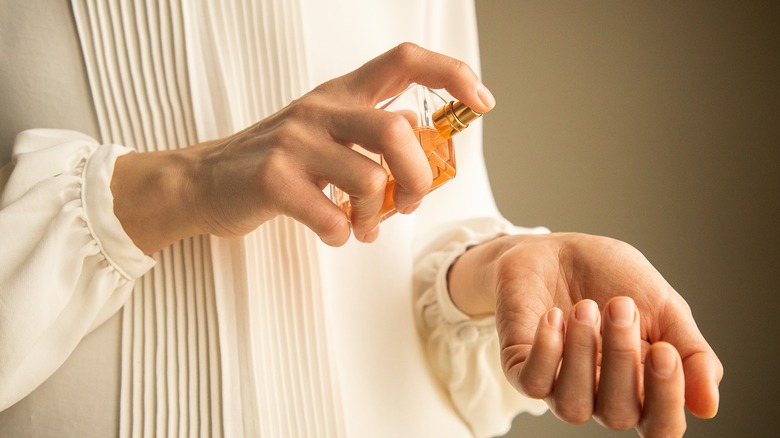Soothing Scents That Actually Repel Mosquitos Like Magic
Nothing can ruin a weekend camping or barbecuing outdoors faster than a bunch of mosquitoes. While getting eaten up by these bloodsuckers is often just annoying, depending on where you are, mosquitoes can also be bad for your health as some harbor diseases like Zika, malaria, and yellow fever. Overall, there are many reasons why no one wants to get bitten by mosquitoes. However, the problem with most anti-mosquito measures is some can be downright harmful — like the mosquito yard sprays that also kill pollinators. While others, like DEET-based repellents, are safe but smell terrible.
While the smell of mosquito repellent may not matter if you are hiking or camping, if you just showered and simply want to sit out on your back porch in peace, or are attending an outdoor wedding or formal event, you might not want to spray yourself down with a stinky chemical-based repellent. Luckily, for situations like this, there are plenty of more pleasant scents that have been proven to repel mosquitoes. While your mind may immediately go to citronella oil as a good option with its pleasant lemony aroma, unfortunately, a 2017 study published in the Journal of Insect Science showed that citronella doesn't work as well as repelling mosquitoes previously thought.
So, what are some good-smelling ways to defend against these bloodsucking critters?
Oil of lemon eucalyptus
Oil of lemon and eucalyptus has a pleasant-smelling, lemony, fresh scent and is quite good at repelling mosquitoes. In fact, out of all the natural mosquito repellent options, oil of lemon eucalyptus (also known as OLE) is the most scientifically proven. The same study that found that citronella oil wasn't very good at repelling mosquitoes also found that OLE worked as well as DEET at repelling the bloodsuckers by making a person wearing the oil around 60% less attractive to mosquitos.
Furthermore, besides working as well as DEET against mosquitoes, OLE is also a good tick repellent. A review of previous research published on Wilderness and Environmental Medicine found that OLE was more effective than DEET at repelling ticks. So, if you want a natural solution that smells good, OLE just might be it.
However, it is important to know that OLE is different from lemon eucalyptus essential oil. OLE comes from natural eucalyptus oil but goes through a special enrichment process to make the active ingredients stronger and better at repelling insects. Anecdotally, some sources claim that eucalyptus essential oil is also a good insect-repellent, however, it's never been scientifically tested.
Incense sticks and smoke
It is a well-known fact that mosquitoes don't like smoke. That's why you may not get bit sitting next to a bonfire but will get eaten alive during the walk back to your house. However, if you are throwing an outdoor barbecue and don't want to have a bonfire, one great way to use smoke to ward off mosquitoes is by lighting incense sticks or coils. Both incense sticks and coils can be easily purchased online and produce smoke that smells wonderful to humans but bad to mosquitoes — like lemongrass and rosemary.
The best way to implement this method of mosquito repellent is to place the burning incense on the ground under each table or near the feet of yourself and your guests. This way, the smoke will protect the feet and ankles of everyone and then protect the rest of the body as it rises. However, the one disadvantage of using smoke to repel mosquitoes is that it isn't 100% effective, and how well it works may depend on wind conditions and how much smoke a particular type of incense can produce.
One Redditor on the incense forum of the website recommended using temple incense because this style of incense stick is made to be burned outside and produces more smoke. You can also purchase incense sticks and coils that have been made specifically to be used outside to repel insects.
Strong essential oils
When looking up options for natural insect repellents online, your search engine will most likely be flooded with different essential oils which anecdotally work well to repel the biting insects. While it is true that some mosquitoes don't necessarily like the strong smell of certain essential oils, there's also a lot of misinformation out there.
According to a study published in the Journal of Medical Entomology that focused on the effectiveness of essential oils at different percentages of dilution against mosquitoes, some essential oils are better than others. In fact, the study found that cedarwood oil didn't work at all and peppermint essential oil only worked in very high concentrations. Instead, the oils that worked the best were thyme and clove. They also discovered that the combination of clove, geranium, and thyme essential oils worked well.
Another more recent article published in Insects found that many essential oils, including peppermint, petitgrain, and a combination of sage and patchouli, were effective in repelling mosquitoes. However, this study used the essential oils at their full strength instead of diluting them. The problem with this is that strong essential oils can cause skin irritation and it is recommended to dilute them to 5% for skin application and around 10% for perfume. Therefore, the downside of using essential oils is that you may not be able to safely apply them in a strong enough amount to be effective. Instead, using a diffuser may be a better option.
Tropical coconut
Another interesting study that was published on iScience and conducted in 2022 set out to discover how different soaps interact with the natural smell of the human body to either attract or repel mosquitoes. While the results for most scents weren't strong enough to be taken seriously, coconut was the one soap scent that was proven to repel the bloodsuckers. In fact, according to the lead researcher from the study, Clement Vinauger, in an interview with NBC News, "[the study] confirms what past studies have found, that mosquitoes don't like coconut-scented products, so our safest bet right now is to use those."
However, before you go out into the backcountry with only a bottle of coconut-scented lotion, it's important to know that this study, although exciting, was rather small and the concept requires further research. Also, the study only used a certain breed of mosquitoes, which are found primarily in the southern and southwestern United States. As NBC News notes, the U.S. contains around 200 species of mosquito and it can't be certain that coconut-scented products will work as well against the other species as it does against the one used in the study until there is more research.
Certain brands of perfume
As it's common folklore that sweet-smelling perfumes attract mosquitoes, this one is surprising — but, in 2015, it was accidentally discovered during a study on the effectiveness of commercial insect repellents that was published in the Journal of Insect Science that certain brands of sweet perfume can repel mosquitoes. Specifically, the perfume that was tested and repelled the insects the best in the study was Victoria's Secret Bombshell, which, according to the researchers, was "shown to be a strong repellent with effects lasting longer than 120 minutes." However, the researchers did note that they used a high concentration of the perfume in the study and that the results may not be the same at a lower concentration. So, if you're going to try this method, remember to really douse yourself.
The same study also discovered that Avon Skin So Soft bath oil, which has long been believed online to be an effective mosquito repellent, was "shown some level of protection for 120 minutes." However, according to the Connecticut Agriculture Experimentation Station, the moisturizing oil only works against mosquitoes for about 10 to 30 minutes and doesn't work against ticks at all.

